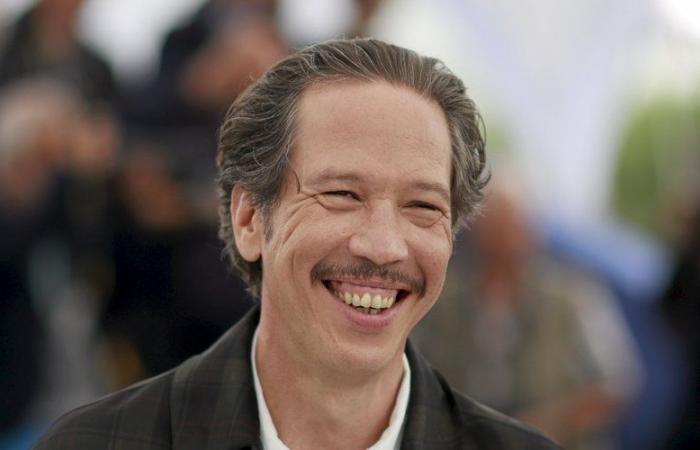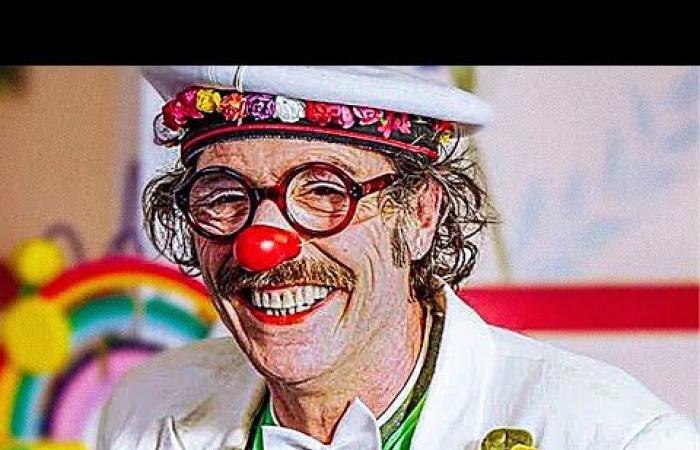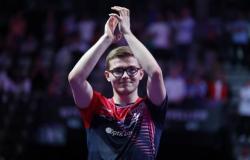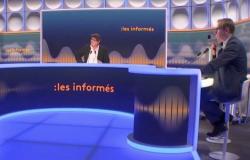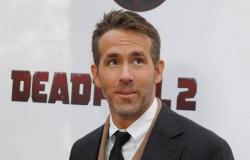Guest of honor at the 46th Mediterranean Cinema Festival in Montpellier, Reda Kateb is undoubtedly the coolest, most elegant French actor of today, and no less the nice one! He looks back on his impressive career as an actor before presenting this Thursday, October 24 in preview his (excellent) first feature film as director, “Sur un fil”.
What feeling inspires you to be the guest of honor at a festival dedicated to Mediterranean cinematography?
It’s obviously gratifying to be the guest of what seems to me to be a very beautiful festival. Cinemed had already invited me several times but I was unable to make myself available at those times. This year it was possible. I am very happy that this corresponds with the release of my film On a thread which I will therefore be able to show in this festival.
A meeting like this is an opportunity to take a step forward in your career. Is this a type of exercise that you do?
Milestones? No, except when I answer questions, I do indeed happen to be asked to do this exercise. But naturally, I am more inclined to look ahead, I admit, than to take stock.
Cinemed is showing ten of your films out of the thirty-six in which you have starred. Thirty-six films in fifteen years (not counting the series)! You work like crazy, right?
I didn’t know I had done thirty-six…. I work a lot but at the same time, I’m not necessarily shooting all the time. There are periods when I have several interesting projects that I actually do one after the other. But there are also other periods when I refuse a lot and when I tour a little less. But, overall, is it true that I have had a good pace in recent years? (laughs)
How do you choose your projects?
A bit by instinct. Often, when reading the script, after a few pages, I feel whether or not I will want to go there. Obviously, there is the character that is offered to me: is it something that I have just interpreted? Does this sound like something I already have in mind coming soon? There is also the quality of the dialogues, I am very attentive to that: does it sound like in life or are we dealing with overly written dialogues which, in my opinion, do not sound right? This is the first step, reading the script. Then, if I like the script, there is the meeting with the director: I need to have confidence in the people I work with. I need to feel like I’m a partner in telling a story, just like I wanted all the actors who played on my film to be. I’m not interested in puppet actors who are made to put together their script. What fascinates me is how you bring life into the camera.
Precisely, if the characters you played, although very heterogeneous, have something in common, it is the humanity that you always infuse into them…
Oh well, thank you. I don’t really know what to say to that! Let’s say that if cinema has superpowers, it is in particular that of revealing the humanity in people, bringing out emotions… Just like a hospital corridor. It’s a place where people reveal themselves beyond their profession, their posture, what they would like to show about themselves to others, in a form of exercise in truth that touches me. Because beyond our differences, there are still very strong things that bind us to each other and that are dear to me.
What is similar to what you are saying is your very unique ability to be able to play a guitar genius as well as an emergency doctor, an educator, an Algerian thug… You can play everything!
I don’t know if I can play everything, but what’s certain is that I first wanted to become an actor to disguise myself. So I definitely wouldn’t want to go from that to something that would reduce me to a few similar jobs. Each film for me is a fantastic passport not only to disguise myself but also to discover worlds, other than through tourism. I can be adopted by the gypsy world when I do Django just like by submariners when I do The song of the wolf or by associations that work with young autistic people in Exceptional. I use the chance he gave me to make cinema to discover other worlds and also introduce them to others.
Do you think that the fact of having been revealed late (compared to the standards, let’s say, which are worth what they are worth), of having had other lives before, so to speak, helped the actor that you are?
Yes, I think so. In any case, I am sensitive to actors in cinema who bring much more of a life experience than theater classes. The very clean technique affects me little. On the other hand, to have real people, human beings, who we feel have sometimes rubbed shoulders with life, as I have rubbed shoulders with it myself, that touches me. I further think that people also identify differently when they are given something where there is more truth. Yes, ultimately I thank life for having had a little success around my thirties at a time when I was still quite developed as a person, where I could also navigate it with a little lucidity.
We remain in the idea of human depth…
Yes, in any case, I always told myself that life was more important than what we do. You have to have this humility, I find, as an artist, to try to be on the same level as life in what you represent. It was very much the challenge of my film, in particular, to try to bring this hospital service to life with truth. I still felt a little dizzy before the first day of filming, I said to myself “But who am I to choreograph a hospital service? I don’t know much about it, in the end”. So I relied a lot on the nurses who were there, the clowns, a whole bunch of people to try to have the decor and the terrain as accurate as possible to then be able to tell a fiction and a story.
Before talking about your feature film, we must talk about “Pitchoune”, the short that you made in 2015, the year in which you released six films, and not the least!
Yes, it was quite a year! Actually, I had been an animated clown. For children’s birthday parties but also at the camper van show. I still remember the way people looked at me in the living room canteen, with my big slippers, my disguise: some with a kind look, others with pity, still others with contempt. And there was this moment when between two warehouses in the show, I smoked a cigarette and I told myself that one day I would make a short film of this experience. In 2015, I kept the promise I made to myself. It was also a way of saying goodbye to this chapter of my life at a time when I felt it was changing for me. It’s on the set of the film Hippocrates that I sketched out the idea for my short with Philippe Rebbot to a producer, and she told me I’ll produce it for you. It was his concrete gesture that pushed me to take the plunge.
But it took you nine to go from short to feature film…
I didn’t have anything to say that I really cared about. I also don’t want to stretch my short into a long one: the gesture would have been sluggish, what I had to say lasted in twenty-two minutes, period. And then I enjoyed myself as an actor in lots of very different things. I didn’t have that frustration of the actor who finds that he doesn’t express himself enough even though he has plenty of things to say. But when my producer Robin Boespflug-Vonier sent me the book The Diary of Doctor Giraffe by Caroline Simonds, the founder of the association Le Rire Médecin, it clicked for me.
What told you that there was a film in this testimony about hospital clowns?
Already while reading, I saw images coming out of the pages. It’s written like a diary with great accuracy, simplicity, with this emotional lift which means that on the same page you can have something sunny and something very hard, without pathos or morbidity. I found a place which is that of childhood, from the perspective of the child who is always in the present moment, and I discovered the profession of hospital clown whose professionalism and rigor I was unaware of. I had a very strong intuition that this particular place at the crossroads of artistic form and care would be where I was going to write my story.
There is something of a brotherhood of spirit with the cinema of Toledano and Nakache…
A totally accepted fraternity! We could even say that there is a connection between Exceptional and my film, especially since I worked with Dorian Rigal-Ansous who is the editor of many of the Toledano-Nakache films. It’s after Exceptionalafter discovering the world of associations that work with young autistic people, I began to be interested in that of clowns. I wanted to extend this gesture of cinema which highlights very discreet heroes.
By being like them “On a thread” between tragedy and comedy, humor and harshness but without dolorism…
It’s a tone that came naturally, through immersions in hospital departments and interactions. I didn’t leave with any intentions other than to bring some life into it. In each scene, the objective was not to box up written dialogue but to ask ourselves what is really happening at this moment, what line of text can we remove, for the benefit of with a look, a gesture, and to improvise, quite a bit in fact. In short, it was about adapting the cinema devices to the subject, bringing this big machine into line with the finer things that we wanted to find…
There are several levels of reading of “Sur un fil” which is also, it seems to us, a reflection on the artistic gesture.
That’s what fascinated me about this world. There is something of the order of ritual in the hospital room where these clowns operate: there you have two clowns for a sick child, it is the only place where you have more actors than spectators, and the spectator is not a spectator because as soon as the child suggests something, the clowns catch it and improvise on it. In short, something happens in the room which only has value for the people who share it and which is not intended to be applauded, admired or recognized. For me, yes, it is a bit of the pure essence of the artistic gesture which has value for what it gives, and not for what it brings back.
With this film, which we wouldn’t imagine wouldn’t work, are you opening a new chapter in your career? Already another film project?
No plans to produce it, but if one day another story is as close to my heart, I’ll go for it. But for now, I’m getting back to my life as an actor. My next project is a play, I haven’t been on stage for seventeen years so it’s a new challenge. It is Through the villagesby Peter Handke, directed by Sébastien Kheroufi (whom I love): we are going to perform it in December at the Autumn Festival at the Center Pompidou, and also on tour a little. I also did last year The Quiet Ones, shot between Denmark and Sweden, by the young Danish director Frederik Louis Hviid, who we went to defend in Toronto; a film about the biggest bank heist in history in Denmark which will be released in France on March 19. I also shot a comedy directed and directed by Jean-Pascal Zadi, about an African space expedition; my first real comedy!

